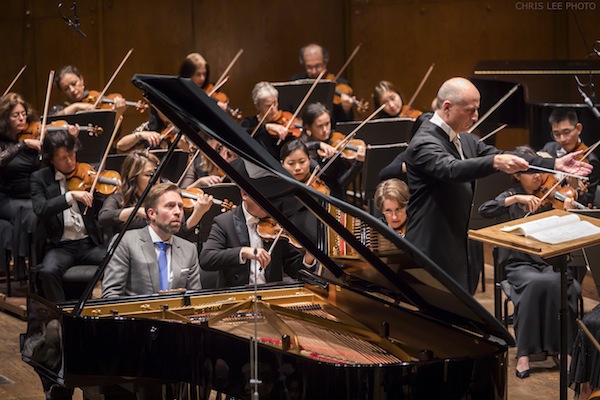Music from the North with Andsnes, Paavo Järvi and Philharmonic

Leif Ove Andsnes performed Rachmaninoff’s Piano Concerto No. 4 with Paavo Järvi and the New York Philharmonic Thursday night.at David Geffen Hall. Photo: Chris Lee
Is geography destiny? Does proximity make for greater understanding?
The classical music world seems to think so, with all the concert programs where orchestras play music from one country or region. Perhaps pianist Leif Ove Andsnes thinks so too; there must be some explanation why he played Rachmaninoff’s Piano Concerto No. 4 with the New York Philharmonic in David Geffen Hall Thursday night.
Guest conductor Paavo Järvi obviously had a hand in the program, bookending the concerto with music from his fellow Finns–Esa-Pekka Salonen’s Gambit and Sibelius’ Symphony No. 5. There’s certainly no reason to begrudge national pride in those two composers.
Still, with the Rachmaninoff what ensued was a failure to communicate. Andsnes is not just a superb pianist, with one of the finest techniques one will witness, but one of the most interesting musicians on the classical scene. He plays with power, fire, and poetry, and also with a notably deep intelligence—his phrases have a granitic, finely edged logic, and he shines in music from the classical era.
But Rachmaninoff’s capricious, discontinuous themes in this work defy any sense of logic. Nor could Järvi and the Philharmonic make a case for any coherence in the music, and the orchestration sounded too thick and stuffy.
Rachmaninoff was experimenting with deliberately choppy form in this concerto. He could not pull himself out of his natural song-like thinking and sentimentality, though, and the result is a piece that sounds very much like what a pianist would have improvised as accompaniment to a silent film.
Andsnes seemed to hear this, and played with a great deal of wit—at the best times the music sounded more like Charlie Chaplin than Rachmaninoff. His smooth, flying fingers roused the audience to an extended ovation, which led to an encore that brought out the best in the pianist; Impromptu No. 5, Op. 5, from his newly released CD of piano music by Sibelius. It was a reminder of how logic and clarity can produced great beauty.
Sibelius’ greatness speaks for itself in pieces like Symphony No. 5. In contrast to the middling orchestral playing in the first half, this performance was an improvement. It wasn’t technically impeccable, with some thinness and insecure intonation in the violins, and the horns didn’t always produce a full sound, but these were minor compared to the spirit in the playing and Järvi’s impressive thinking.
He had a strong handle on the piece’s architecture, with a smooth shape and judicious proportions in every long crescendo and accelerando, all subtly and skillfully rendered.
More important in the second and third movement’s Järvi captured Sibelius unique and powerful sense of time. On top, the music flowed and expanded, it looked out at the changing world around it. Underneath, the internal foundation rotated on its axis, meditating on memories and imagination. This was deeply evocative and true to Sibelius’ art.
Gambit was proof that geography is not necessarily destiny—unless it is the peculiar geography of the modern conductor, made up of airports and concert halls.
As a composer, Salonen is an exemplar of contemporary cosmopolitanism; music with a diatonic foundation, a romantic desire to express something, kaleidoscopic orchestration, and bits and pieces of the past, especially that of the last century.
A quasi-overture, Gambit begins with a gorgeously shining stillness, veering into a percussion concerto grosso, with echoes of John Adams and Stravinsky. It has all of Salonen’s strengths and weaknesses as a composer: dazzling colors, formal imagination, verve, and also a sort of ADHD feeling of jumping to the next idea even when the previous one is incomplete. Balancing problems in the orchestra made it sound alternatively brilliant and ungainly. In retrospect, perhaps that exactly reflects our contemporary musical landscape.
This program will be repeated 8 p.m. Saturday and 7:30 p.m. Tuesday. nyphil.org






